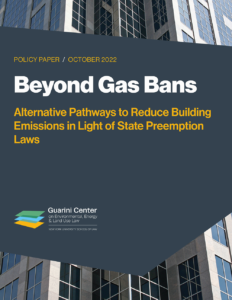At the federal level, opportunities to advance emissions reductions from buildings have expanded due to the passage of the Inflation Reduction Act, which aims to speed the nation’s transition to carbon-free energy sources. However, many municipalities have seen their powers to steer building decarbonization curtailed in recent years. Notably, between 2020 and 2021, 20 states passed laws limiting local governments’ authority to regulate the installation or use of natural gas infrastructure.
The goal of this paper is to provide guidance about climate- and public health-related policy options that remain viable in the face of these state-level laws. Our analysis takes a case study approach, focusing on the “bans on bans” that were enacted by Georgia, Missouri, and Texas. Overall, we find that municipalities likely retain significant authority to take robust steps to reduce building emissions and improve indoor air quality. In particular, measures aimed at increasing buildings’ energy efficiency offer municipalities a way both to achieve these policy goals and to protect residents against current and future energy resource challenges.
